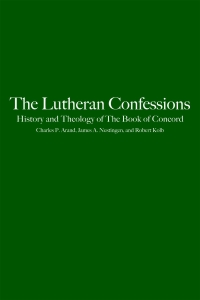
Arand, Charles P., Robert Kolb, and James A. Nestingen. The Lutheran Confessions: History and Theology of The Book of Concord. Minneapolis: Fortress, 2012. 341 Pages. Paper. $39.00. http://store.fortresspress.com/store/product/17009/The-Lutheran-Confessions-History-and-Theology-of-The-Book-of-Concord (LHP)
When I was recruited to go to seminary, I was told that a new translation of the Lutheran Confessions was about to be published. Five years later, I got a copy of Kolb/Wengert as a seminary graduation present.
There was a lot to like. It was an improvement and update compared to the 1959 Tappert Edition. There was the benefit of decades of scholarship Tappert, et al, did not have access to. And then there was controversy, like the octavo/quarto debate. And so we ended up with (finally!) a Concordia from Concordia.
For me, the best part of the new edition was the companion volume, Sources and Contexts (2001). Honestly! Again I was told another volume was to follow on history and theology. Now, more than a decade later, Arand joins Kolb and Wengert in completing this twenty-year-long, three volume project (vii).
From their formulation in the sixteenth century through the present day, every generation of Lutheran leadership has grappled with the centrality and importance of the Lutheran confessional writings. In this important new volume, Arand, Kolb, and Nestingen bring the fruit of an entire generation of scholarship to bear on these documents, making it an essential and up-to-date class text.
The Lutheran Confessions places the documents solidly within their political, social, ecclesiastical, and theological contexts, relating them to the world in which they took place, and assists readers in understanding the issues at stake in the narratives, both in their own time and in ours. (publisher's website)
Most likely intended as a seminary-level text, many will critique the choices of language here regarding "Confessing in the Wittenberg Manner" (9), the Marburg Colloquy (95), the denunciation of the Pope as Antichrist (153), and assessment of the Philippists and Gnesio-Lutherans (185).
Winkels will benefit from study of this volume, whether beside Kolb/Wengert, Concordia Triglotta, or Concordia: The Lutheran Confessions.
I am most encouraged that the authors place the Confessions in "their political, social, and theological contexts," yet confess them as the timeless confession of the Lutheran Church and not merely an historical relic.
The Rev. Paul J Cain is Pastor of Immanuel Lutheran Church, Sheridan, Wyoming, Headmaster of Martin Luther Grammar School, Yellowstone Circuit Visitor (LCMS Wyoming District), a member of the Board of Directors of The Consortium for Classical and Lutheran Education, Wyoming District Worship Chairman, and Editor of QBR. |
